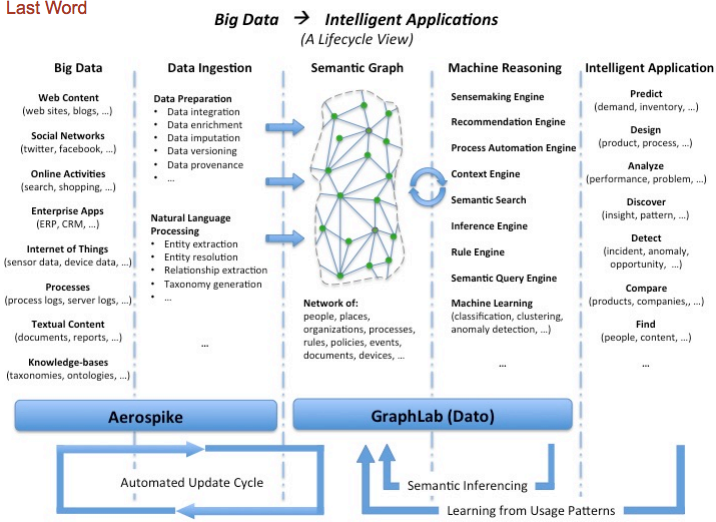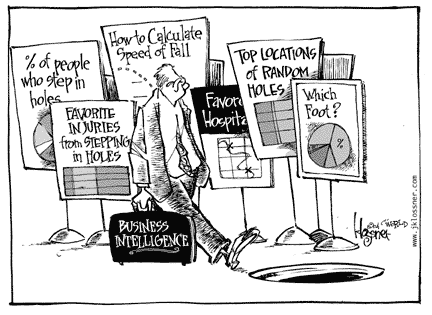The Hitchhiker Guide to A.I.
Warning: this is a long article, almost 1500 words long.
A lighter, friendly edited version was published by CNBC
on Friday, 27th of March, 2015. You can find it here.
'If there is Artificial Intelligence then we won’t need to think’ said my recently-turned-ten daughter, on our way driving her to a piano lesson.
She left me speechless while I was trying, in vain, to remove from my mind a sticky image from the movie ‘The Hitchhiker guide to the Galaxy’. A supercomputer called ‘Deep Thought’ which, after 7,5 million years of calculations rendered the answer to the Ultimate Question of Life, the Universe and Everything, or, namely, the number 42.
Quirky cult movies aside, the impact of artificial intelligence is immense, and the implications phenomenal.
An utopian-dystopian future:
Artificial Intelligence (A.I.) is on the hype again. There are dystopian, terminator-like views backed up with warnings from renowned scientists, Stephen Hawking to start with. Even Tesla and SpaceX founder Elon Musk appeared on CNBC’s ‘Closing Bell’ cautioning about the potential risks of this technology.
On the other side, Jeff Hawkins, scientist and serial entrepreneur (Palm, Handspring), founder of the Redwood Center for Theoretical Neuroscience, vehemently argues ‘the Terminator is not coming’. His company, Numenta, is reverse-engineering the human neocortex for AI purposes.
But, while an eventual life extinction event comes, we have families to care about and businesses to run so, what is this technology going to do to us in the short term and more importantly, as a CEO, what should I do about it?
noteworthy: this draft spun off another great post from Peter J. Simons on the topic, see here 'How Artificial Intelligence can boost Corporate Innovation'
Business impact, artificial intelligence today:
Firstly, for business purposes, we should think of Artificial Intelligence as a natural evolution of technology, enabling yet another disruption wave in markets, though, arguably this time, a much bigger one than the internet was.
Keeping over-hype and human destiny aside, CEOs and management at companies can think of AI as yet another technology disruption. An enormous, multipronged and pervasive one, like digitization and the internet was in the 90’s, or mobility and the smartphones were a decade ago.
First we had data and Databases (i.e Oracle, MySQL), then, back in the 80’s we combined data and infrastructure (Ethernet, Networks, TCP/IP). The Web was a first big data-base (HTML, HTTP), indexed by Google in the 90’s.
Fast forward to the new millennium, dawn of the modern Big Data (Hadoop, Cloudera, Palantir) and built on top, Analytics, thriving and striving to find meaningful insights and patterns in data through Algorithms.
These all evolving ultimately into predictive analytics and Machine Learning (also referred as intelligent applications and Artificial Intelligence).
And here we go, we all witnesses of a new era of Artificial Intelligence now ready for prime time.
(Machine learning is considered actually a branch of artificial intelligence, the other being computational logic & planning.)
Embedded and in many cases unnoticed, today there are already thousands of narrow artificial intelligence applications in areas such as:
· Natural Language Processing (virtual assistants; i.e Siri)
· Finance (stock trading, credit score analysis)
· Toys and games (from Furby to Aibo)
· Publishing & writing (i.e computer generated news)
· Robotics, Genetics, Research, Law, Transportation
Another way to size up intuitively the potential of AI technology is to look at its effects today, starting from those deriving from the good ‘old’ predictive analytics methods:
Using marketing analytics, Target got to know a teenage girl was pregnant before her own father did, isn’t it creepy?
According to Marissa Mayer credit card companies can predict a divorce two years before it happens with 98% accuracy, based solely on your purchase decisions.
High Frequency Trading, enabled by AI algorithms, caused the US stock market crash of 2010 in which the Dow Jones plunged 9% (1.000 points) within minutes. It was the biggest one-day point decline in the history of the Dow Jones. In that year an estimated 70% of all equity trading volume was done by machines.
Companies in general can utilize analytics to predict customer sentiment (a.k.a. V.O.C. or Voice Of Customer). By analyzing unstructured data, from internal sources, databases, CRM as well as data from social networks and public sources, an organization can choose when to intervene and interact directly with customers. All to improve consumer engagement and brand perceptions.
Moreover, machine learning is now in a rapid democratization process. Google Prediction API for instance lets you build your own smart applications for sentiment analysis and purchase prediction, all from the cloud.
Ahead of Google APIs and IBM Watson, the most advanced AI developments today are coming from what is called deep reinforcement learning. Demis Hassabis’ Deep Mind group at Google is at the forefront of this research and the results are impressive:
Remember the old classic Atari games from the 80s? we were dragged into endless hours of fun and play to master Pong, Breakout or Space Invaders, right?. Now, an AI machine with no other input than raw pixels and a reinforcement learning algorithm is capable of over performing the most expert of human players.
In the future nearly everything connected to the internet will use a form of a machine learning algorithm in order to perform its mission.
And Yes, over the course of the following years and decades, A.I. will enable disruptions of the same and bigger magnitude than the internet did. Exciting times ahead for venture capitalists.
What Shall I do as a CEO?
In a simple visual flowchart:
You may expect more and more Everything as a Service, from sourcing talent to getting probabilistic predictions of the sales of your products. Your company needs to keep up with the times, embrace new services, AI based technologies and benefit from them.
Similarly to what happened a decade ago, when enterprise mobility entered the strategic roadmap of all major corporations, AI enabled technologies will become an integral part of the strategy planning process in a near future.
You may think AI is not there, not in a conspicuous way at least, think twice, does your marketing people hire research or customer insights reports? most likely your contractors are using big data analytics to deliver their conclusions to you. Is your competitor doing so in-house? That may indicate they can react and move faster in decision making and eventually interact rapidly and more decisively with (your) customers.
In essence, you need to map out existing internal and external resources of your company and check if they are using any of these big data, analytics and AI related technologies and tools.
See here for detail, courtesy of Jose Luis Martinez Fernandez PhD & CTO at Daedalus S.A. an analytics and predictive technology company.
Plain simple, to monitor AI readiness of your company, first, earmark a tech champion in your management team (if there isn’t one already, the CIO promoted to CDO or CMO will do for the time being), and task her/him to screen out if any of these referred tools or technologies are used either internally or externally. If the answer is a hard no internally, run a supplier & partner appraisal to understand how far AI is from the core of your business.
Give yourself a 1 to 10 score in the lows and start pushing the company to embark in the AI journey (in the same you probably told your management team to start using mobiles, tablets or smartphones at some point in the past).
Finally, think ahead and innovate, if you don’t have internal resources to do it, partner with corporate innovation advisors, launch your own company sponsored start-up incubator, or even a venture fund with a focus on the specific AI enabling technologies, that you have identified as relevant and disruptive to your business. Many of these innovation mechanisms are already one-click away, in the cloud.
Finally, if, like me, you are interested in human intelligence as much as in AI, read on ‘Outliers: from totally dumb to the world genius directory in 48hrs’ (work in progress, to be posted later) and test yourself against the machine to get to know your IQ online, who knows, you could make it to the World Genius Directory.
Dedicated to Juan Antonio Jimenez, school mate, college & university pal, business partner and life time best friends.
Thanks to:
Martina Fernandez - inspiration & purpose - My daughter
Peter J. Simons - lateral thinking - Strategy Consultant, CEO, investment banker & friend
Jose Luis Martinez Fernandez - Technology Expert - PhD, CTO at Daedalus.
Eric Rosenbaum - edition, curation - CNBC
Ed Fernandez is an early stage venture capitalist and board advisor to Daedalus S.A, a data analytics and predictive technology company. He is also a member of the CNBC-YPO Chief Executive Network. He can be reached in real time at @efernandez
About Daedalus - Wikipedia: http://en.wikipedia.org/wiki/User:Daedalus,_S.A./sandbox



![Super-Breakout-2011-08-10-09-50-33-63[1]_0](http://static1.squarespace.com/static/5554afd4e4b03e9b3e7c0a44/55707a0ce4b072236bd945cd/55707aa9e4b072236bd968dc/1428070033000/super-breakout-2011-08-10-09-50-33-631_0.jpg?format=original)
